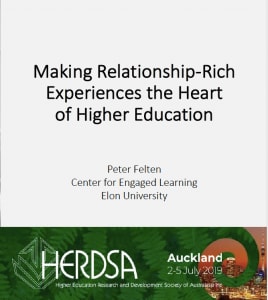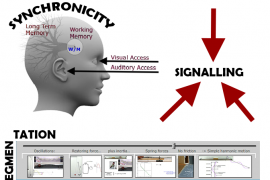 Students crave personal connections with their teachers and with each other. Even with shifts to more online and blended delivery of content, it is the development of the relationship with their lecturers and tutors that students tell us that they both value and need to feel connected to the University and ultimately the disciplines in which they choose to focus. This is clear in formal and informal student evaluations and is thus a strong theme in the Student Experience Strategy. It is probably also reflects many of our own personal experiences of university – it certainly does for me.
Students crave personal connections with their teachers and with each other. Even with shifts to more online and blended delivery of content, it is the development of the relationship with their lecturers and tutors that students tell us that they both value and need to feel connected to the University and ultimately the disciplines in which they choose to focus. This is clear in formal and informal student evaluations and is thus a strong theme in the Student Experience Strategy. It is probably also reflects many of our own personal experiences of university – it certainly does for me.
The theme of HERDSA2019 was “Next Generation, Higher Education: Challenges, Changes and Opportunities”. It was refreshing to see a focus on the importance of human relationships rather than technology, fancy frameworks or talks on ‘impact’ and ‘effectiveness’. Professor Peter Felton‘s keynote was an inspiring talk on how relationships are at the heart of improving the student experience. With the massification and commercialisation of higher education coupled with increasing mental health diagnoses and pressures outside of university study, human connection is more important than ever.
Peter’s keynote was based on his research on over four hundred interviews with students and academic staff at U.S. universities and colleges which explored why students do not routinely experience educationally meaningful relationships with peers and academic staff. His context is what he calls the ‘new majority’; that is students who are predominantly first-in-family and studying in non Ivy League institutions such as State and Community colleges.
In an increasingly vanilla and globalised world…universities tend to gravitate towards a comfortable and comfortably measurable sameness. Within this space, it is not always easy to acknowledge or value indigeneity, local flavour or special character… (Buissink et al., 2017)
He spoke about the importance of making students feel welcome, and encouraging a sense of belonging, and stressed the ideas of a “relentless welcome”, “inescapable opportunities for meaningful interactions” and having “a constellation of mentors, including mentors of the moment”. Interviews with students suggest that having a just-in-time mentor step in at an important moment can have a hugely positive impact on their sense of wellbeing and belonging.
He used the example of a student who had enrolled in a maths degree and ran into trouble with calculus. “Early in Calculus 2, we started getting into really difficult things and I suddenly began having these feelings like I didn’t belong in this class — that my education, what I was trying to achieve, wasn’t possible and my goals were just obscenely farther away than I thought they were….”
“I went to Professor Arco to say that I might have to drop out. He told me, ‘Joshua, I don’t want you to do the homework tonight. I want you to look up imposter syndrome and read about it. Then come and talk to me.’ I did that, and I learned that it is extraordinarily common among students. That interaction bolstered my confidence to realize that I’m not alone in this, that everyone has these feelings. I went from contemplating dropping out to getting tutoring help – and then getting an A in the course.” (Joshua Rodriguez, Oakton Community College)
Students who feel like imposters are less likely to ask for help, so using inclusive teaching methods and making an effort to get to know your students and their background can be a very powerful way of improving students’ outcomes.
When students perceive an instructor knows their names, they report feeling more valued, motivated, and comfortable asking for help. (Cooper et al., 2017)
Practical ideas to improve relationships

- Introduce yourself to your students with an introductory email, message or quick phone video at the beginning of semester.
- Change the term ‘office hours’ to something that people can understand – students don’t know what this means! Try ‘student drop in hours’ instead.
- Use name tents in lectures and tutorials so that everyone can get to know each other’s names. Make sure that names are added to both sides so both the teacher and fellow students can see them.
- Use the SRES to personalise communication with your students.
- Use student names in feedback – even going back and adding a quick ‘well done’ comment after anonymous marking has been turned off.
- Use SRES or even Canvas site access analytics to keep track of students who may be struggling, and shoot them a quick, personalised check-in email.
- Encourage students to meet each other in class – use an icebreaker and encourage groupwork to build community.






8 Comments